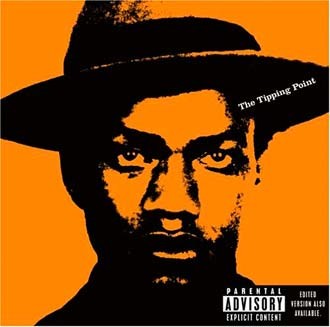|
By John DeFore Alternative hip-hop, past and present The Tipping Point (Geffen) may not be the right title, carrying as it does associations of turning points, back-breaking straws, and the like, but this latest record from The Roots is still a step in the right direction. Less self-consciously arty than their last one, Phrenology, the record stretches from the standard "hey, they play their own instruments!" identity without feeling jumbled or forced. Veering into electronica on "Don't Say Nuthin'" and "Duck Down!," the disc is laced with references to violence, dirty jobs, and military service; it quotes Sly Stone and Marvin Gaye and lays down seriously danceable beats, reminding music lovers that "funky" and "political" aren't contradictory adjectives. Politics and protest, of course, play a big role in the new Beastie Boys disc, the NYC-centric To The 5 Boroughs (Capitol), which proudly wears the Twin Towers on its cover and gets nostalgic about longstanding NY pleasures. As with the Roots' new one, this steps back from the group's most experimental work. Many of the instrumental tracks (produced by the band) are simpler than some of the tricked-out stuff on recent discs, but the Boys certainly aren't living in the past: "That's It That's All" opens with an explicit call for Dubya's dethronement, and there's plenty of like-minded stuff amid the shout-outs to hip-hop's early days. A little blast from that past comes courtesy of Rhino and Tommy Boy, who have dug up two new De La Soul titles, De La Mix Tape and Live At Tramps, NYC 1996. The second disc is self-explanatory, a fine live set in a genre where live shows are rarely worth immortalizing on disc; the trio are clearly tired of being hounded to do ancient hits - the chorus of "Me Myself and I" becomes "we hate this song" - but it's an entertaining set nevertheless, featuring Mos Def and the Jungle Brothers. The Mix Tape catches the band in remixes and rarities back when favorite tracks like "The Magic Number" were fresh. One heir to De La's "conscious" heritage is Michael Franti, who started off aggro in his Disposable Heroes of Hiphopricy but has gotten more friendly with every new album - both with his spin-off group Spearhead and now solo. Songs from the Front Porch (Boo Boo Wax) is less hip-hop than Heron - Gil Scott, that is, the pioneer of soulful and socially conscious jazz poetry. Tracks like "Firefly" lack the bite that Scott-Heron generally offered with his smooth sounds, unfortunately; after making openly political music back when there didn't seem to be a call for it, Franti seems content to smoke dope and sing about love. Plenty of dope, a bit of love, and a whole lot of ambition fill A Grand Don't Come For Free (Atlantic), the sophomore release by one-man British act The Streets. An album-length story that does a remarkable job of keeping the sounds diverse while sticking to a narrative thread, it surely marks Streetmeister Mike Skinner as one of the most serious new voices in hip-hop. There are fewer killer individual tracks here than on Original Pirate Material, but this record packs an emotional punch that one didn't, painting a compelling picture of the songs' narrator, who may or may not resemble the actual man on the mike. Even newer on the block than the Streets is Madvillain, although it's only the moniker that's new: MF Doom (the MC) and Madlib (beats), the artists behind the mask, have been around for some time, and this self-titled collaboration (released on Stones Throw) follows a great deal of bootlegging and anticipation in the underground hip-hop community. The final result is phenomenal, a comic-book-obsessed explosion of creativity that packs maximum astonishment into each track. If Doom and Madlib feel like keeping this act together for more than a one-off, they're look like shoe-ins to become the ruling superheroes of hip-hop. • By John DeFore
|


